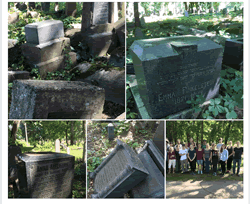Lithuania: Cemetery Work in Kaunas
Posted on August 10, 2017 by jhe
http://jewish-heritage-europe.eu/2017/08/10/lithuania-cemetery-work-in-kaunas/%E2%80%9D#.WYw8dH8cZMw.facebook
Work has been going on in Kaunas to clean up and complete the documentation of the long-neglected Žaliakalnis Jewish cemetery and also to research the site of World War II mass graves.
The cemetery documentation is being carried out by international volunteers during a summer volunteer camp organized by Germany’s Action Reconciliation Service for Peace ARSP) NGO in partnership with the Maceva Litvak Cemetery Catalogue.
The camp — taking place from August 6 to 20 — involves 25 volunteers from Ukraine, Germany, Austria, Lithuania, Chile, Denmark, and Luxembourg. It falls under the international project Oppression and Opposition: Opportunities of Civic movements in Europe’s Past and Present, organized by the ARSP, with backing from the Europe for Citizens Program of the EU, which includes volunteer camps in Greece, Italy, and Hungary as well as in Lithuania.
(A closing conference and opening of an exhibition about opposition and resistance created by participants at the volunteer camps in all for countries will take place November 9th, 2017 in Berlin.)
Maceva reports, on the Lithuanian Jewish community web site:
We have and are receiving significant support from the Kaunas municipality who are paying close attention to the cemetery and doing their best to bring it back to a respectable state.
The Jewish cemetery in the Žaliakalnis district of Kaunas was established in 1861 and closed in 1952. It is listed on the registry of cultural treasures and is protected by the Lithuanian state as a cultural heritage site. Many famous and notable figures are buried there, including politicians, scholars, religious leaders and cultural figures such as the writer Jacques Lipchitz and the vocalist Daniel Dolski. The graves of more historical personalities will likely come to light after successful inventory and documentation this summer.
Besides the work in the cemetery, volunteers will have an opportunity to get to know more about Lithuanian Jewish history and culture. We look forward to meeting people from the Judaica Research Center, the International Center for Litvak Photography and Bella Shirin.
Meanwhile, also in Kaunas, an international archaeological team has been using ground-penetrating radar and other non-invasive technology to studying the Holocaust sites and identify mass graves at the Fourth, Seventh and Ninth Forts.
The research is being conducted by an international team led by Dr. Richard Freund, the Director of the Maurice Greenberg Center for Judaic Studies at the University of Hartford. Freund was part of the team that has been researching the site of the Great Synagogue in Vilnius and site of mass executions at the Ponary Forest outside Vilnius.
